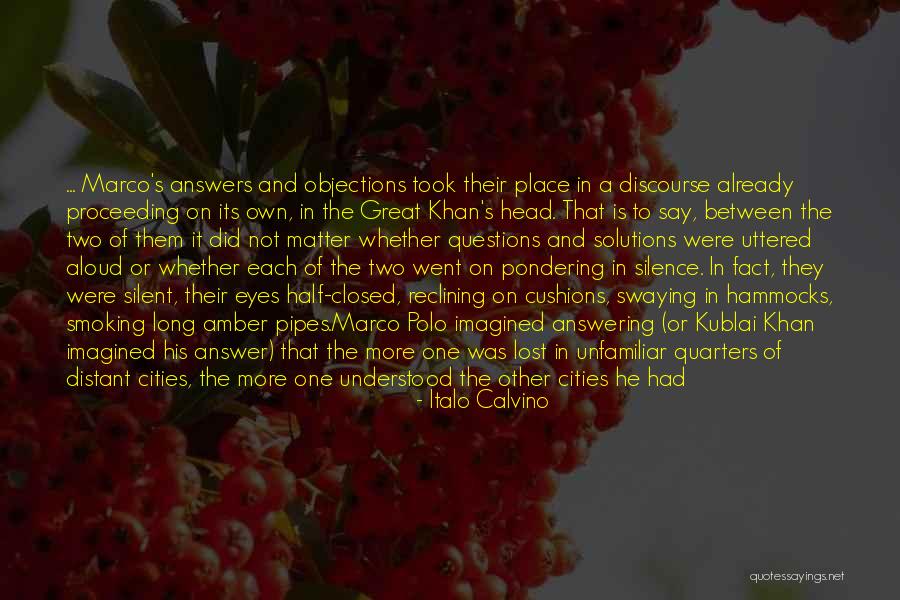
Calvino wrote his master’s thesis on Joseph Conrad, who is best known for Heart of Darkness, and though Conrad wrote in an entirely different style than Calvino, both men focus to a degree on exploration of “new” lands and the consequences of such exploration.

Within Invisible Cities, Calvino makes direct references to Thomas More’s Utopia and Aldous Huxley’s Brave New World, as well as to Guy Debord’s seminal 1967 philosophical work Society of the Spectacle, which critiques modern consumer culture and criticizes modern dependence on images to mediate experiences. Invisible Cities draws on The Travels of Marco Polo, which was recorded late in the 13th century by Rustichello de Pisa from Polo’s recollections of his travels. Calvino died in 1985 of a cerebral hemorrhage. He wrote Invisible Cities during this time. After the death of a close friend and the cultural revolution in France, Calvino went through an “intellectual depression” and joined the Oulipo group of writers. He left the Italian Communist Party after the Soviet Union invaded Hungary in 1957, and though he retained his belief in communism as a concept, he never joined another party. After this, he began to write fantastical novels, all of which were well received. He began publishing novels and stories to great acclaim in the late 1940s, but his realist novels received poor reviews. Following the war, Calvino returned to Turin, completed a master’s thesis on Joseph Conrad, and became active in communist groups and publications. He went into hiding rather than join the military, decided that communists had the most convincing argument, and joined the communist Italian Resistance in 1944. During World War II, Calvino enrolled at the University of Turin and then at the University of Florence in their Agriculture departments, hiding his literary interests. His parents were openly derisive of both religion and the ruling National Fascist Party and as such, they exempted Calvino from religious classes at school. His father spent time in Mexico before moving to Cuba, and his mother gave Calvino his first name to remind him of his Italian heritage-though Calvino’s family moved back to Europe when Calvino was two years old. Next time, though, I'd actually like to see someone go through them.Calvino was born in 1923 to Italian botanists and agronomists. I'm glad that "Invisible Cities" exists, and it's likely that someone out there could make an argument that the book opened doors for the writers who followed Calvino. I read in a rush for a book group, and that might have been a less-than-ideal situation. The book is, I'm sad to say, probably only readable because it's so short, and it might be one to savor at the pace of a chapter a day. I can certainly see how this book might have had a profound influence on some modern fantasy authors, and I'm probably glad it exists, but I'm not sure that I enjoyed it. Still, I'm not sure how much of the book I'll remember, what will stick with me and what won't, and, yes, I imagine that that's a proposition that Calvino himself might have enjoyed, or even intended.

The most human element here seems to be the names of the cities themselves, as most of them seem to be named after women. But when it comes right down to it, the book is all setting: as with most post-everything lit, the whole enterprise often seems more clever than affecting.
ITALO CALVINO INVISIBLE CITIES QUOTES SERIES
The author presents the reader with a series of beguiling concepts, enchanting images, and logical puzzles: "Invisible Cities" has sort of a "ViewMaster on acid" thing going on. Still, the lack of anything like a conventional plot makes it hard to really grab onto anything here.

It's easy to trace his obsessions: opposition, form and nothingness, signs and their meanings, the limits of language, the process of accretion and destruction, the long, slow cycles of history. It's certainly imaginative and, in places, it's very beautiful: Calvino's writing is precise and his vocabulary seemingly boundless. If you set out to write novel without any characters or plot, you might end up with something like Italo Calvino's "Invisible Cities." It's fifty or so descriptions of imaginary cities tied together, more or less, by a frame tale describing the meeting between Kublai Khan and Marco Polo.


 0 kommentar(er)
0 kommentar(er)
